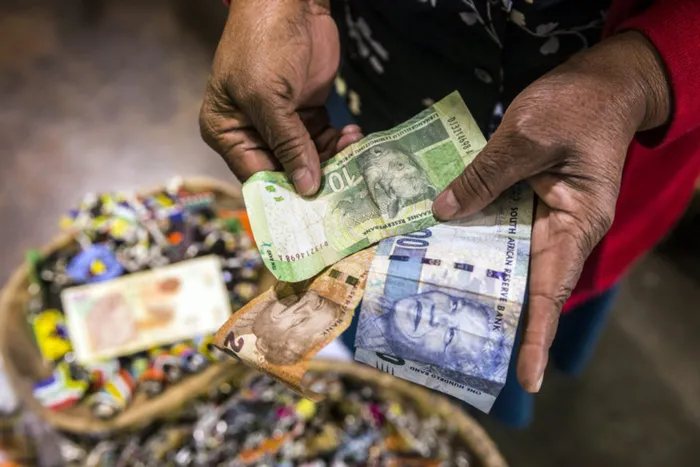The bitter pill? VAT hike's threat to South Africa's agricultural heart and food security
VAT

South Africa's Treasury cancelled planned VAT increase amid economic challenges welcomed. The ripple effects of increased input costs will have inevitably reached consumers through higher food prices.
Image: IOL/Independent Newspapers
By Dr Thulasizwe Mkhabela
The recent tabling of the 2025/26 budget, with its proposed 2% increase in Value Added Tax (VAT) spread over two years, has ignited a firestorm of debate. While the National Treasury aims to bolster State coffers, the potential repercussions for South Africa's agricultural sector and, critically, our nation's food security warrant serious scrutiny. This VAT hike presents a significant threat that demands careful consideration.
Agriculture, the bedrock of food security and a significant contributor to South Africa's economy, operates on tight margins. Input costs, ranging from fertilisers and pesticides to fuel and machinery, are already substantial and often volatile. A VAT increase directly inflates these costs. Farmers, particularly small-scale producers vulnerable to price fluctuations and lacking economies of scale, will face increased financial pressure. This could lead to reduced productivity, delayed investments in crucial infrastructure and technology, and potentially even farm closures.
The ripple effects of increased input costs will inevitably reach consumers through higher food prices. While basic food items are currently VAT-exempt, the increased production, processing, and transportation costs – all subject to VAT – will be factored into the final price. This indirect impact will disproportionately affect low-income households, who already spend a significant portion of their income on food. A seemingly small 1% yearly increasecan translate to a substantial burden on those struggling to put food on the table, exacerbating food insecurity.
Furthermore, the VAT hike could stifle growth within the agricultural sector itself. Reduced profitability may deter new entrants, particularly young entrepreneurs, from venturing into farming. It could also disincentivise expansion and innovation, hindering the sector's ability to meet the growing food demands of a burgeoning population. A weakened agricultural sector translates to a less resilient food system, making the nation more vulnerable to external shocks and price volatility in global markets.
The argument that increased government revenue from VAT will ultimately benefit the populace through improved services needs to be weighed against the immediate and direct impact on food affordability and agricultural viability. While fiscal responsibility is crucial, policies must be carefully evaluated for their potential to undermine food security, a fundamental human right.
The government must explore alternative revenue-generating measures that do not disproportionately burden the agricultural sector and the poor. Targeted support programs for small-scale farmers to absorb increased input costs, coupled with efficient and transparent use of existing tax revenues, should be prioritised. A comprehensive review of the VAT exemption list for essential food items could also be considered to further cushion the impact on vulnerable households.
To mitigate the negative effects of the proposed VAT increase on South Africa's agricultural sector and food security, several alternative policy options can be considered:
1. Targeted Subsidies and Support for Agriculture:
- Direct Input Subsidies: Implement subsidies on essential inputs like fertilisers and seeds to reduce costs for farmers, especially small-scale producers.
- VAT Rebates for Agricultural Inputs: Allow registered agricultural producers to claim VAT rebates on specific farming inputs, effectively zero-rating them.
- Financial Support Programs: Enhance low-interest loans or grants for small-scale farmers to invest in technology and infrastructure.
2. Enhancing Food Security for Low-Income Households:
- Expansion of Social Safety Nets: Increase the value of social grants to bolster the purchasing power of vulnerable households.
- Targeted Food Assistance Programs: Strengthen food assistance initiatives like school feeding schemes and food vouchers for low-income families.
- Zero-Rating Additional Basic Food Items: Review and potentially expand the list of VAT-exempt basic food items to alleviate the VAT impact on low-income households.
3. Strengthening the Food Value Chain:
- Investment in Infrastructure: Increase investment in rural infrastructure to lower transportation costs and food prices.
- Support for Local Food Production: Implement policies encouraging local food production to reduce reliance on imported goods.
- Reducing Food Waste: Initiate programs to minimise food waste through training onbetter handling and consumer awareness.
4. Exploring Alternative Revenue Generation Measures:
- Progressive Income Tax Adjustments: Adjust the income tax system to ensure higher earners contribute more, rather than increasing VAT.
- Wealth Tax: Consider a wealth tax on high-net-worth individuals to generate revenue without impacting basic consumption.
- Increased Efficiency in Tax Collection: Improve the efficiency of tax collection to reduce the need for broad tax increases.
In conclusion, while the need for fiscal consolidation is understood, the proposed VAT hike carries significant risks for South Africa's agricultural sector and the food security of its citizens.
Policymakers must engage in thorough consultations with agricultural stakeholders and food security experts to fully understand the potential deleterious effects and explore more equitable and sustainable alternatives.
Failing to do so could sow the seeds of deeperfood insecurity and undermine the long-term health of a vital sector of our economy.
The bitter pill of a VAT hike might ultimately leave a far more damaging aftertaste for the most vulnerable in our society and the agricultural landscape that sustains us all.

Dr Thulasizwe Mkhabela is an Honorary Research Fellow with the African Centre for Food Security and the University of KwaZulu-Natal
Image: LinkedIn
* Dr Thulasizwe Mkhabela is an Honorary Research Fellow with the African Centre for Food Security and the University of KwaZulu-Natal and an independent agricultural researcher and policy analyst with extensive experience in South African and African agricultural's development issues. He is also a director and Senior Researcher at Outcome Mapping.
** The views expressed do not necessarily reflect the views of IOL or Independent Media.
BUSINESS REPORT